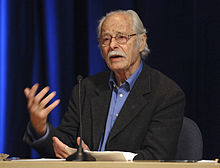Barth, Frederik Thomas

Bio: (1928 –2016) Norwegian anthropologist. Fredrik Thomas Barth studied at the Universities of Chicago and the London School of Economics. He worked at the University of Bergen, where he founded the Department of Anthropology. He also taught at the University of Oslo, Emory, Harvard, and Boston. He carried out fieldwork in Iraq, Iran, Sudan, Norway, Pakistan, Oman, and New Guinea.
Barth studied politics, economy, symbols, rituals, and ethnicity. Barth’s first book Political Leadership among Swat Pathans (1959) was the product of fieldwork done in Pakistan among an ethnic group of Swat Pathans that speak the Pashto language. This book was focused on politics and power dynamics in Pathans society. Barth states that Pathans didn’t have any institutionalized political structure, instead, they had many leaders that competed among themselves. People who followed those leaders did that, not based on kinship or group affiliation, but voluntarily, deciding for themselves who to follow. Relation between followers and leaders was “transactional”. Transactional relationship meant that leaders gave gifts and protection to their followers, and, in turn, follower gave their allegiance and armed support. The transactional relationship also meant there were no true loyalty to leaders, and if a leader lost his wealth or honor his follower would switch their support to another leader. There were two types of leaders. The first type was secular leaders whose power came from ownership of land and fierceness in battle. The second type of leader was saints who got their power from being a moral and religious authority and through the mediation of feuds. The roles of these two types of leaders were complementary. Aside from the transactional model of relations Barth also recognized the generative model in which the aggregate choices of individuals directed the processes which unintentionally generate new societal structural forms.
Barth presented the relational theory of ethnicity in the book Ethnic Groups and Boundaries: The social organization of culture difference (1969); which he was the editor of. Barth wants to explain how ethnicity persists, and his answer is to emphasize the borders between ethnic groups, rather than the cultural differences or similarities that existed within those borders. For Barth, contacts between ethnic groups actually strengthen boundaries between those ethnic groups. He applied his generative model to the creation of ethnic groups – ethnicity arises through self-ascribed identity and meaning, and that identity is generated and maintained by creating strict ethnic boundaries and not by creating ethnic homogeneity. Relation between culture and ethnicity is complicated because most ethnic groups have only some unique cultural elements, while others are shared with other ethnicities. But those cultural elements that are specific to some ethnicity are especially used to reinforce ethnic identity and ethnic boundaries. He believes that ethnic identity has been manipulated throughout history to achieve strategic political, economic, and environmental goals.
In his later works, he turned to the anthropological study of knowledge. One example of this focus is the book Ritual and Knowledge among the Baktaman of New Guinea (1975), which was based on his fieldwork in New Guinea in 1968. The focus of this research was the male rate of passage rituals that involved initiation into secret male cult, where boys achieved manhood, social recognition, and sacred knowledge. After undergoing initiation himself Barth discovered the world full of symbolism, myths, knowledge, and non-verbal communication. In this book, Barth also raises the question of the possibility that informants from the society that anthropologist explores can give an artificially crated answer to the question posed by the researcher. Barth is the creator of a very successful Norwegian anthropological tradition, which also attracted anthropologists from other Scandinavian countries.
Fields of research
Aggression Agriculture Anthropology Authority Body Communication Community Conflict Sects and Cults Culture Customs, Social Diffusion Ethnicity History Identity Inequality, Social Islam Kinship Knowledge Language Leaders Morality Myth Nonverbal Communication Politics Power, Political Religion Secret Sign and Symbol Tradition TribeMain works
Political Leadership among Swat Pathans (1959);
Nomads of South-Persia; the Basseri tribe of the Khamseh Confederacy (1962);
Models of Social Organization (1966);
Ethnic Groups and Boundaries. The social organization of culture difference (1969);
Ritual and Knowledge among the Baktaman of New Guinea (1975);
Cosmologies in the Making : a generative approach to cultural variation in inner New Guinea (1987);
Balinese Worlds (1993).

